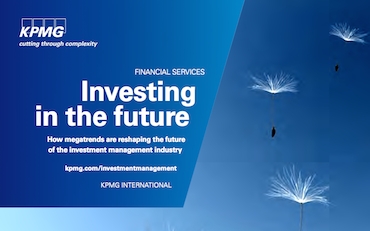'Change your business or it will die' is the stark message to asset managers who have been told they must adapt to technology as the industry verges on a huge shake up in the coming decade.
The authors of the KPMG Investing in the Future report predicted that most people will buy investment products on-line rather than through a face-to-face adviser and said customers will also buy based on their own research supported by crowd-sourced opinions on 'TripAdvisor type' websites.
The global asset management industry will radically transform due to seismic shifts in client demographics, technology and changing social values and behaviours, according to KPMG.
The report predicted that by 2030 the client base of a typical asset manager will be completely different to today's, and warned that current business models will not be fit for purpose.
{desktop}{/desktop}{mobile}{/mobile}
Tom Brown, global head of investment management at KPMG, said: "We are on the verge of the biggest shake-up the industry has experienced; and the message to asset managers is clear – adapt to change or your business won't survive.
"The two biggest issues that need to be addressed are the changing client base and technology.
"It is no longer just about attracting the clients who are armed with cash and ready to invest.
"The successful asset managers of tomorrow must focus on building cradle-to-grave relationships with a dramatically different and more diverse client base from today, which includes much younger investors.
"They must also be mindful that women are increasingly controlling a bigger share of family wealth.
"Demographics are changing. People are living longer and taking greater responsibility for their own retirement planning."
He predicted younger generations would save more as they see their parents run out of money in retirement.
Ian Smith, financial services strategy partner at KPMG, said: "Technology plays a critical role in the industry's future.
"The growing relevance of online communities and social networks is changing attitudes and behaviours. Consumers are increasingly looking to 'people like me' rather than professionals for advice, guidance and direction."
"The clients of the future will be fundamentally different in terms of their needs and expectations. They will demand more personalised information, education and advice that will require asset managers to radically address their technology capabilities to really understand their clients and support this level of service.
"
{desktop}{/desktop}{mobile}{/mobile}
Chris Williams CFPCM, who has recently established new online financial advisory firm Wealth Horizon, said: "Technology is key to bridging the investment landscape. Clients are already using technology as part of their everyday lives and are increasingly looking for advice online."
Mr Williams, an IFP board member, said: "It is vital for the industry to adapt to the growing challenges presented by technology. Current advice business models are too focused on the needs of the adviser. They need to look at how they can better serve the needs of the customer."

